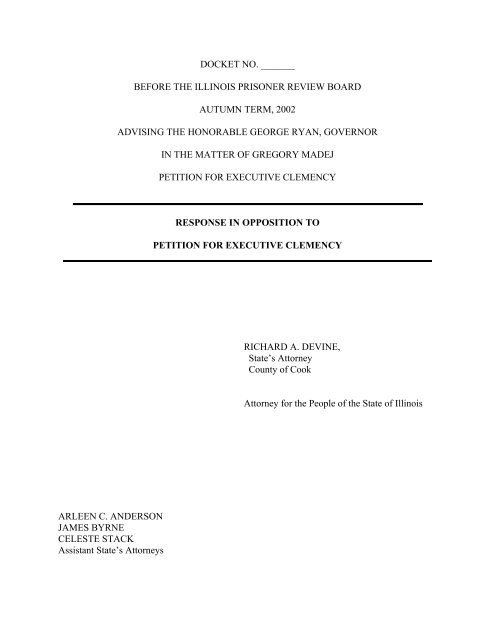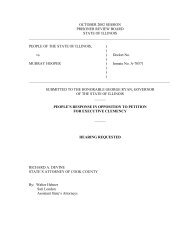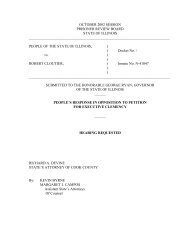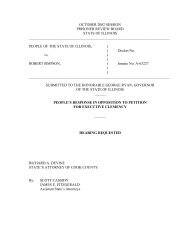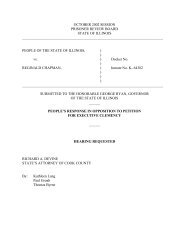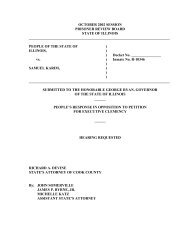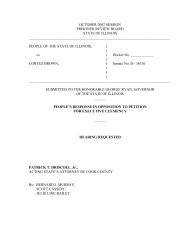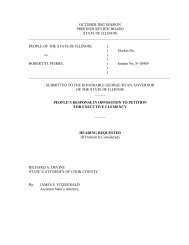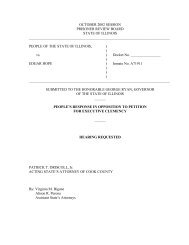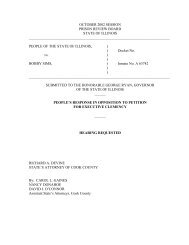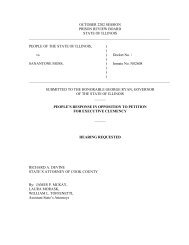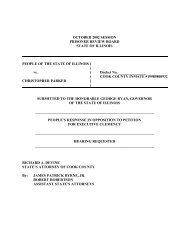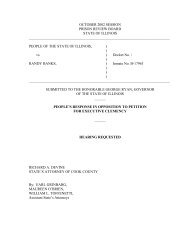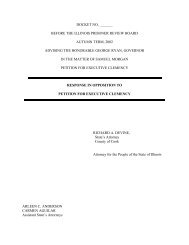Gregory Madej - Cook County State's Attorney
Gregory Madej - Cook County State's Attorney
Gregory Madej - Cook County State's Attorney
You also want an ePaper? Increase the reach of your titles
YUMPU automatically turns print PDFs into web optimized ePapers that Google loves.
DOCKET NO. _______<br />
BEFORE THE ILLINOIS PRISONER REVIEW BOARD<br />
AUTUMN TERM, 2002<br />
ADVISING THE HONORABLE GEORGE RYAN, GOVERNOR<br />
IN THE MATTER OF GREGORY MADEJ<br />
PETITION FOR EXECUTIVE CLEMENCY<br />
________________________________________________________________________<br />
RESPONSE IN OPPOSITION TO<br />
PETITION FOR EXECUTIVE CLEMENCY<br />
____________________________________________________________________________<br />
RICHARD A. DEVINE,<br />
State’s <strong>Attorney</strong><br />
<strong>County</strong> of <strong>Cook</strong><br />
<strong>Attorney</strong> for the People of the State of Illinois<br />
ARLEEN C. ANDERSON<br />
JAMES BYRNE<br />
CELESTE STACK<br />
Assistant State’s <strong>Attorney</strong>s
DOCKET NO. _______<br />
BEFORE THE ILLINOIS PRISONER REVIEW BOARD<br />
AUTUMN TERM, 2002<br />
ADVISING THE HONORABLE GEORGE RYAN, GOVERNOR<br />
IN THE MATTER OF GREGORY MADEJ<br />
PETITION FOR EXECUTIVE CLEMENCY<br />
____________________________________________________________________________<br />
RESPONSE IN OPPOSITION TO<br />
PETITION FOR EXECUTIVE CLEMENCY<br />
____________________________________________________________________________<br />
I.<br />
INTRODUCTION<br />
Following a bench trial , petitioner was convicted of murder, rape, deviate sexual assault and<br />
armed robbery in 1982. The trial judge sentenced petitioner to death on the murder. 1 The judge also<br />
merged petitioner’s conviction for deviate sexual assault into his rape conviction and sentenced<br />
petitioner to 30 years on the rape and 30 years on the armed robbery, both sentences to run<br />
concurrently. The Illinois Supreme Court affirmed petitioner’s convictions and sentences on direct<br />
appeal in People v. <strong>Madej</strong>, 106 Ill. 2d 201, 478 N.E.2d 392 (1985). The United States Supreme<br />
Court denied petitioner’s petition for writ of certiorari in <strong>Madej</strong> v. Illinois, 474 U.S., 106 S.Ct. 268<br />
(1985), reh’g denied, 474 U.S. 1038, 106 S.Ct. 608 (1985). Subsequently, the Circuit Court of <strong>Cook</strong><br />
1<br />
Although petitioner claims that the State offered him a plea offer of 80 years, neither<br />
former prosecutor remembers such an offer and have submitted affidavits so indicating.<br />
2
<strong>County</strong> denied Petitioner’s amended petition for relief filed pursuant to the Post-Conviction Hearing<br />
Act. The Illinois Supreme Court affirmed the denial of post-conviction relief in People v. <strong>Madej</strong>,<br />
177 Ill. 2d 116, 685 N.E. 2d 908 (1997), and the United States Supreme Court denied petitioner’s<br />
petition for writ of certiorari in <strong>Madej</strong> v. Illinois, 523 U.S. 1098; 118 S. Ct. 1565 (1998).<br />
In May of 1998, petitioner filed in the Illinois Supreme Court a motion for leave to file a<br />
petition for an original writ of mandamus on the claim that the State of Illinois violated Article 36 of<br />
the Vienna Convention on Consular Relations, April 24, 1963, 21 U.S.T. 77, T.I.A.S. No. 6820 [the<br />
“Vienna Convention”] and Article 29 of the Consular Convention, May 31, 1972, U.S. – Pol., 24<br />
U.S.T. 1231, T.I.A.S. No. 7642. The Court denied petitioner’s motion on June 17, 1998.<br />
After the Illinois Supreme Court denied petitioner’s motion, he then filed a petition for postjudgment<br />
relief, pursuant to 735 ILCS 5/2-1401, in the Criminal Division of the Circuit Court of<br />
<strong>Cook</strong> <strong>County</strong>, as well as a petition for writ of mandamus pursuant to 735 ILCS 5/14-101 in the<br />
Chancery Division of the Circuit Court of <strong>Cook</strong> <strong>County</strong>. The Chancery judge transferred the case to<br />
the Criminal Division for consolidation with the criminal case after granting the Polish Consul<br />
General’s motion for intervention.<br />
In the consolidated matter, then-Presiding Judge Thomas Fitzgerald entered judgment<br />
denying both petitions on procedural grounds. In 2000, the Illinois Supreme Court affirmed the<br />
judgment of then-Judge Fitzgerald, finding that because the Vienna Convention provides that the<br />
rights under the Convention are to be exercised in conformity with the laws of the receiving state,<br />
(Illinois), petitioner was not entitled to relief because he had not filed within the applicable time<br />
limitation for a § 2-1401 petition, and had failed to demonstrate that he had an affirmative right to<br />
relief to justify the issuance of a writ of mandamus under state law. People v. <strong>Madej</strong>, 193 Ill.2d 395,<br />
3
739 N.E. 2d 423 (2000). The United States Supreme Court then denied petitioner’s petition for writ<br />
of certiorari in Consul Gen. of the Republic of Pol. v. Illinois, 533 U.S. 911, 121 S. Ct. 2262 (2001),<br />
reh'g denied, Consul Gen. of the Repubic of Pol. v. Illinois, 122 S. Ct. 32 (2001).<br />
In 1998, petition also filed a petition under 28 U.S.C. § 2254 in the United States District<br />
Court for Northern District of Illinois. In March 2002, United States District Court Judge David E.<br />
Coar entered an order denying most of petitioner’s § 2254 claims, but granting him relief in the form<br />
of a new sentencing hearing on the basis of ineffective assistance of trial counsel at sentencing. The<br />
judge found that counsel failed to investigate and introduce “mitigating evidence” of petitioner’s<br />
substance abuse and troubled childhood, and failed to inform petitioner that a jury must be<br />
unanimous to impose the death penalty. United States ex rel. <strong>Madej</strong> v. Gilmore, 2002 U.S. Dist.<br />
LEXIS 3807, *22-24 (N.D. Ill. Mar. 7, 2002). The State, however, has filed a motion to reconsider<br />
based on a new United States Supreme Court case, Bell v. Cone, 122 S.Ct. 1843 (2002), which it<br />
believes is dispositive of the matter. Petitioner has also filed his own motion to reconsider. The<br />
court ordered briefing on the motions, which are currently pending before the court.<br />
Finally, in December of 2000, petitioner filed in the Circuit Court of <strong>Cook</strong> <strong>County</strong>, a second<br />
petition for § 1401 or, in the alternative, a successive petition for post-conviction relief under the<br />
Illinois Post-Conviction Relief Act. In that petition, <strong>Madej</strong> argues that although recent DNA testing<br />
done in this case conclusively establishes that he is the source of sperm from vaginal and rectal<br />
swabs taken from the victim, he is actually innocent of the deviate sexual assault charge. Petitioner<br />
also argues in the petition that his trial counsel labored under a conflict of interest because counsel,<br />
at that time, was also employed with the Illinois Secretary of State as a “Technical Advisor III.” The<br />
petition is currently pending before Presiding Judge Paul P. Biebel.<br />
4
For the reasons that follow, the People of the State of Illinois urges Governor Ryan and this<br />
Board to reject <strong>Gregory</strong> <strong>Madej</strong>’s bid for executive clemency.<br />
II.<br />
STATEMENT OF FACTS<br />
1. The Savage Murder of Barbara Doyle<br />
The naked body of the victim, Barbara Doyle, was found in an alley on the north side of<br />
Chicago in the early morning hours of August 23, 1981. She had been stabbed and slashed 34<br />
times. A post-mortem examination revealed the presence of numerous abrasions over various parts<br />
of her body. Most of the more serious wounds were located on her head, face and chest. The postmortem<br />
also revealed semen in the victim’s vagina and rectum. The results of DNA testing<br />
completed just last year, by an independent forensics lab, established that petitioner was the source<br />
of the sperm present in the victim’s vagina and rectum.<br />
Petitioner was arrested in Ms. Doyle’s automobile after a high-speed chase by police.<br />
Police initially spotted petitioner at about 5:00 am, driving through a posted stop sign. When police<br />
signaled for petitioner to pull over, he instead accelerated, speeding away and driving through red<br />
lights in excess of 80 miles per hour. Police finally apprehended petitioner after he drove into an<br />
alley and tried unsuccessfully to escape on foot.<br />
When police officers arrested petitioner, his hands, head, shirt, pants and undershorts were<br />
splattered with blood, as was Ms. Doyle’s car, mostly in the area of the passenger’s seat. Upon<br />
searching the vehicle, police recovered a large knife as well as Ms. Doyle’s jeans and blouse, both of<br />
which were saturated in blood.<br />
At the police station, petitioner told police the following implausible story:<br />
5
He had been drinking in a tavern until about 2:20 am. After being thrown out, petitioner met<br />
a friend named “Hojamoto,” who was driving the victim’s car. When petitioner got into the car, he<br />
noticed that Hojamoto was wearing a bloody shirt. Hojamoto told petitioner that he had been in a<br />
gang fight. Petitioner then changed seats with Hojamoto, who jumped from the car during the highspeed<br />
chase with the police.<br />
James Bunker, who knew petitioner socially, testified at trial that he was at a party with<br />
petitioner on the night before Barbara Doyle was murdered. He stated that petitioner had taken a<br />
“Buck-type knife” from another person at the party. He identified the knife, which police recovered<br />
from the victim’s car, as the knife petitioner had taken. Bunker also testified that “Hojamoto” was a<br />
fictitious name commonly used by petitioner and friends as a form of greeting. In fact, petitioner<br />
had in the past referred to Bunker as “Hojamoto,” and vice versa. When asked why the group used<br />
the name, Bunker responded, “[It was] just like a greeting, you know .... How are you doing?<br />
Moto.”<br />
Petitioner testified on his own behalf at trial. In contrast to his original statement to police, at<br />
trial, petitioner claimed that he killed Ms. Doyle in her car only after they had stopped twice for<br />
consensual sex and when she drew a knife on him during a drug deal that had gone bad. Petitioner<br />
claimed that during the struggle, he gained control of the knife and began stabbing the victim.<br />
Petitioner stated that he realized what he was doing only after he saw the victim bleeding from her<br />
chest. He then removed her body from the car and drove to friend’s house. Petitioner stated that he<br />
next recalled being chased by police, but could not remember anything else other than being taken<br />
into custody.<br />
In petitioner’s Statement of the Facts of the Offense in his clemency petition, he fixates on a<br />
6
911 tape, recording the voice of one of the arresting officers while pursuing petitioner, which<br />
purportedly refers to a second white suspect being in the victim’s car prior to petitioner’s arrest.<br />
(Clem. Pet. at 9, 11, 12, 13, 16). In the Illinois Supreme Court, petitioner argued that introduction<br />
of the 911 tape at trial would have raised a reasonable doubt as to his guilt. The court,<br />
however, held that petitioner had waived the issue because he failed to raise the<br />
argument, either on direct appeal or in his amended petition for post-conviction relief, and<br />
further found no reason to excuse the waiver under the court’s exception for plain error.<br />
People v. <strong>Madej</strong>, 177 Ill. 2d at 156.<br />
In his § 2254 petition in federal court, petitioner asked the district court judge to forgive his<br />
state procedural waiver and to examine the merits of the claim involving the 911 tape. In analyzing<br />
the argument, Judge Coar stated:<br />
There is no evidentiary support for <strong>Madej</strong>'s [911 tape/reasonable doubt] claim. The<br />
results of the DNA tests, which this Court ordered, showed that petitioner is the<br />
source of the sperm found in Barbara Doyle's vagina and rectum. Trial counsel was<br />
not ineffective for failing to pursue a reasonable doubt theory and relief is denied on<br />
this ground. Any claim <strong>Madej</strong> attempts to assert on actual innocence grounds<br />
similarly fails.<br />
United States ex rel. <strong>Madej</strong> v. Gilmore, 2002 U.S. Dist. LEXIS 3807, *37 (emphasis added).<br />
B. Petitioner’s Personal History<br />
Petitioner was a year and a half old when he came to the United States from Poland.<br />
Although neither petitioner nor his parents ever became naturalized American citizens, at the time of<br />
his arrest, petitioner was classified in this country as a lawful permanent resident alien.<br />
At his first post-conviction proceedings, petitioner presented evidence that, here in Chicago,<br />
at school and in the community, petitioner was part of the mainstream American culture. Indeed,<br />
literature of second generation Poles addresses their need to eschew their own culture and identify<br />
7
with the American culture.<br />
Petitioner attended various local grade schools as a child in Chicago. Through the eleventh<br />
grade, until he enlisted in the United States Army, he attended Foreman High School, where he<br />
participated in ROTC. While in the U.S. Army, he spent time in Korea and earned his GED. In<br />
1977, he was granted an honorable discharge and returned home to Chicago. In June, 1977,<br />
petitioner enrolled at Triton College, but withdrew in late fall of that year, citing financial<br />
difficulties. Petitioner’s rap sheet indicates that this time period marked the beginning of a long<br />
string of arrests and convictions that culminated in his arrest for Barbara’s Doyle’s murder in 1981.<br />
(See tables containing petitioner’s convictions and arrests on pages 50-51 of the clemency petition)..<br />
Petitioner left Chicago in late summer, 1978, and traveled around the United States for<br />
several months. He spent a couple months in California where he worked part-time, doing odd jobs.<br />
He returned to Chicago for a while in late 1978, and was then arrested for theft and sentenced to one<br />
year probation. Petitioner then went back to California, but in February 1979, returned to Chicago.<br />
Shortly thereafter, he was arrested again, found to be in violation of probation, and sentenced to 18<br />
months in the Illinois Department of Corrections. Petitioner had only been on parole for<br />
approximately eleven months when he was arrested for the murder of Barbara Doyle.<br />
III.<br />
REASONS FOR DENYING CLEMENCY<br />
A. Because Petitioner is Still Litigating in Both the State and Federal Courts,<br />
Issues Involving the Reliability of His Convictions and Sentence, and, As it<br />
Stands Now, Will Get A New Sentencing Hearing, Petitioner Is Not One for<br />
Whom the Clemency Process Is Intended.<br />
Section 13 of article 5 of the Illinois constitution gives the Governor the “power to grant<br />
reprieves, commutations and pardons, after conviction, for all offenses, subject to such regulations as<br />
8
may be provided by law relative to the manner of applying therefor.” Indeed, “clemency<br />
proceedings are not part of trial – or even the adjudicatory process.” Ohio Adult Parole Authority v.<br />
Woodward, 523 U.S. 272, 284 (1998). Clemency procedures are not intended to determine the guilt<br />
or innocence of the defendant. Id. Nor are they intended primarily to enhance the reliability of<br />
convictions or sentences as are direct appeal and collateral relief proceedings Id. Instead, clemency<br />
is an executive function independent of trial, direct appeal and collateral relief proceedings. Id. It<br />
was established to “prevent[] miscarriages of justice where judicial process has been exhausted.”<br />
Herrera v. Collins, 506 U.S. 390, 412 (1993). It is traditionally available to capital defendants as “a<br />
final and alternative avenue of relief,” “exist[ing] to provide relief from harshness or mistake in the<br />
judicial system.” Woodward, 523 U.S. at 284-85. It is the “final stage of the decisional process that<br />
precedes an official deprivation of life.” Id. at 292 (Stevens, J., concurring in part and dissenting in<br />
part). Executive clemency provides the “fail safe” in our criminal justice system. Herrera, 506 U.S.<br />
at 415.<br />
Petitioner readily concedes in his clemency petition that he still has cases pending both in the<br />
federal and state courts. (Clem. Pet. at 19). In fact, petitioner specifically requests in his petition<br />
that, if “the Governor is not prepared to exercise his clemency and other executive powers to grant<br />
<strong>Gregory</strong> <strong>Madej</strong> any of the relief sought [ ], <strong>Gregory</strong> <strong>Madej</strong> respectfully requests that the Governor<br />
grant him no relief at all.” (Clem. Pet. at 6, 20) (emphasis in original). Petitioner makes this request<br />
because he “believes that the judicial process will afford a more fitting disposition of this matter in<br />
the event the Governor is not prepared to grant any of the relief sought [in the clemency petition].”<br />
(Id.) (emphasis added).<br />
Clearly petitioner is not one for whom the clemency process is intended. Instead of using the<br />
9
process as a final avenue of relief, or the “fail safe” in our criminal justice system after exhaustion of<br />
the judicial process, <strong>Madej</strong> is simply petitioning for clemency in hopes of benefitting from a wellpublicized<br />
potential blanket commutation issued by the Governor before he leaves office 2 Petitioner<br />
should not be allowed to simply abandon the adjudicatory process during which the reliability of his<br />
convictions and sentence, and, as it stands now, even his ultimate sentence, will be determined.<br />
2. Aside From His Request for “no relief at all,” All of Petitioner’s Pleas for “specific,<br />
tailored, relief” Should Be Denied.<br />
In addition to seeking “no relief at all” in his clemency petition, <strong>Madej</strong> seeks what he refers<br />
to as “specific, tailored, relief.” (Clem Pet. at 4). Specifically, he first requests that the Governor<br />
“order that [he] be repatriated to Poland.” (Clem. Pet. at 5). He seeks a commutation of his sentence<br />
to a term of years, so he can be repatriated to Poland, as well as the State of Illinois’ consent to his<br />
transfer to Poland. (Id. at 5, 20). In the alternative, petitioner requests that the Governor enter an<br />
order prohibiting imposition of a sentence of death or natural life upon him during the course of any<br />
further proceedings in his case, and, to ensure that such an order is given effect, he suggests that “the<br />
Governor may wish to pardon [him] of the death eligibility factors of armed robbery, deviate sexual<br />
assault and rape, for purposes of precluding the State’s <strong>Attorney</strong> from relying upon these factors on<br />
resentencing.” (Id. at 5-6).<br />
Repatriation to Poland<br />
Petitioner cites to a state statute which provides that if a treaty in effect between the<br />
2. Even staunch opponents of capital punishment view a potential blanket commutation<br />
as a “vain gesture[]” which, in the long run, “will be no victory for justice.” See Eric Zorn, Take<br />
Death Row Cases One by One or Risk Backlash, CHI. TRIB., Sept. 17, 2002, at § 2, at 1.<br />
10
United States and a foreign county provides for the transfer of convicted offenders to the<br />
country of which they are citizens or nationals, the Governor may authorize the Director of<br />
Corrections to consent to the transfer of a convicted offender to his or her native country.<br />
730 ILCS 5/3-2-3.1. (Clem. Pet. at 20, n. 18). Petitioner argues that his transfer would be<br />
accomplished under the terms of the Council of Europe Convention on the Transfer of Sentenced<br />
Persons, Mar. 21, 1983, 35 U.S.T. 2867, T.I.A.S. No. 10824. (Id.).<br />
One of petitioner’s problems, however, is that the treaty does not apply to prisoners under a<br />
sentence of death. See Article 1 - Definitions: "’sentence’ means any punishment or measure<br />
involving deprivation of liberty ordered by a court for a limited or unlimited period of time on<br />
account of a criminal offence.”(emphasis added). Also, the order or judgment imposing<br />
sentence must be “final.” Since petitioner was recently granted a new sentencing hearing by a<br />
federal district court judge, and that order has not yet been vacated or altered, petitioner would have<br />
trouble meeting that condition of the treaty as well. See Article 3 - Conditions for transfer.<br />
To avoid these barriers, petitioner is asking Governor Ryan to commute his death sentence to<br />
a term of years with the condition that he be repatriated to Poland. Before the Governor acts to<br />
comply with such a request, however, the People of the State of Illinois ask him to consider two<br />
crucial factors.<br />
First, petitioner was convicted of a vicious, senseless crime. Just as he gave Barbara Doyle<br />
no further chance at life, he now gives no sufficient reason to the Board or the Governor to justify<br />
the lightening of his punishment to a term of years. That notwithstanding, petitioner has already<br />
been awarded a new sentencing hearing which, if upheld, could result in a sentence of a term of<br />
years. There is no sufficient reason why petitioner should not be forced to wait out the result of the<br />
11
adjudicatory process in his case, like any other criminal defendant in this country.<br />
Second, the Convention on the Transfer of Sentenced Persons was intended to<br />
apply to true “foreign prisoners,” not persons who have spent virtually their entire lives in<br />
the United States and are simply looking for a way to escape the justice meted out to them<br />
in the country where they committed their crimes. In explaining the general considerations<br />
behind the convention, the Council of Europe stated:<br />
In facilitating the transfer of foreign prisoners, the convention takes account of<br />
modern trends in crime and penal policy.... As penal policy has come to lay greater<br />
emphasis upon the social rehabilitation of offenders, it may be of paramount<br />
importance that the sanction imposed on the offender is enforced in his home<br />
country rather than in the state where the offence was committed and the judgment<br />
rendered. This policy is also rooted in humanitarian considerations: difficulties in<br />
communication by reason of language barriers, alienation from local culture and<br />
customs, and the absence of contacts with relatives may have detrimental effects on<br />
the foreign prisoner. The repatriation of sentenced persons may therefore be in the<br />
best interests of the prisoners as well as of the governments concerned.<br />
Council of Europe, Explanatory Report on the Convention on the Transfer of Sentenced<br />
Persons at 6-7, P 9 (1983) (hereinafter "Explanatory Report"), cited in Bishop v. Reno, 210<br />
F.3d 1295, 1300, n. 9 (11 th Cir. 2000)<br />
Petitioner was brought to this country as baby. He was schooled here; he traveled<br />
here; his family is here, he even joined the United States Army. Petitioner was also no<br />
stranger to this country’s criminal justice system, having spent time on probation and in the<br />
Illinois Department of Corrections before his conviction for the murder of Barbara Doyle.<br />
(See also petitioner’s other arrests and charges which did not result in convictions on pages 50-51 of<br />
the clemency petition). In summary, the treaty of which petitioner tries to avail himself was not<br />
intended to apply to de facto United States citizens like him. Governor Ryan should not facilitate<br />
petitioner’s attempt to obtain a windfall from an instrument never meant to apply to him.<br />
Order Prohibiting Imposition of a Sentence of Death or Natural Life On Petitioner During<br />
the Course of any Further Proceedings in his Case and a Pardon of the Death Eligibility<br />
12
Factors of Armed Robbery, Deviate Sexual Assault and Rape.<br />
Clearly, the Governor’s issuance of an order barring imposition of a sentence of death or<br />
natural life upon petitioner would exceed the authority granted to him under the Illinois Constitution,<br />
as would the granting of a pardon of any death eligibility factor. To reiterate, the state constitution<br />
gives the Governor the “power to grant reprieves, commutations and pardons, after conviction, for<br />
all offenses, subject to such regulations as may be provided by law relative to the manner of<br />
applying therefor.” (Emphasis added). Except where power is given him by that instrument, he has<br />
no authority. People ex rel. Smith v. Jenkins, 325 Ill. 372, 374 (1927). Moreover, if, purporting to<br />
act in the exercise of the power to pardon or commute, the Governor makes an order attempting to<br />
interfere with, control, modify or annul any judgment of a court, his order is void and the officers<br />
charged with the execution of the judgment may be required by mandamus to disregard the order.”<br />
Id. at 374-75, citing People v. Jenkins, 322 Ill. 33 (1926).<br />
In this case, the United States District Court for the Northern District of Illinois ordered<br />
habeas corpus relief in the form of a new capital sentencing hearing. Although cross motions to<br />
reconsider the court’s order have been filed by both parties, and the court has ordered briefing on<br />
those motions, the motions are still pending before the court. An order from the Governor now<br />
barring imposition of a future death sentence on petitioner would be an attempt to “interfere with,<br />
control, modify or annul the judgment” of the federal district court in this case. Accordingly, such<br />
an order would be void.<br />
Finally, in that the state constitution only confers authority on the Governor “to grant<br />
reprieves, commutations and pardons, after conviction, for all offenses” (emphasis added), any order<br />
pardoning petitioner of a death eligibility factor would be a perversion of the power accorded the<br />
13
executive branch under that instrument. Therefore, any such order would also be void.<br />
C. Petitioner Is Not Entitled to Clemency Relief on the Basis of a Vienna Convention<br />
Violation.<br />
Petitioner next argues that he is entitled to clemency because Illinois failed to abide by the<br />
Vienna Convention. In other words, he asserts that he was not properly notified of his rights to<br />
contact the Polish Consulate after his arrest, and that Illinois was required to notify consular<br />
authorities that petitioner had been arrested. The Vienna Convention, not unlike the Convention on<br />
the Transfer of Sentenced Persons, was intended to protect foreigners arrested or detained in<br />
an unfamiliar country, who are disadvantaged because they may be ignorant about the country’s<br />
criminal justice system, the practices of and limitations on police activity, rights accorded the<br />
accused, and the basic legal framework for ascertaining guilt. See Erik G. Luna & Douglas J.<br />
Sylvester, Beyond Breard, 17 BERK. J. INT’L LAW 147, 163 (1999). However, as the federal district<br />
court noted in rejecting petitioner’s treaty claim, petitioner was brought to this country as an infant.<br />
2002 U.S. Dist. 3807, *29. Moreover, being no stranger to this country’s criminal justice system,<br />
petitioner obviously does not fit into the class of defendants mentioned above.<br />
Furthermore, as noted above, the Illinois Supreme Court found in petitioner’s case that the<br />
Vienna Convention itself provides that the rights under the convention are to be exercised in<br />
conformity with the laws of the receiving state -- in this case, Illinois. The court concluded that<br />
petitioner was not entitled to relief on his treaty claims because, under state law, he had not filed<br />
within the applicable statutory time limitation for a § 2-1401 petition -- he filed approximately 14<br />
years too late -- and he had failed to demonstrate that he had an affirmative right to relief justifying<br />
the issuance of a writ of mandamus under state law.<br />
Moreover, the federal district court judge refused to excuse petitioner’s state procedural<br />
14
defaults, finding that petitioner could not show actual prejudice. 2002 U.S. Dist. LEXIS 3807, *31-<br />
32. Indeed, both state and federal appellate courts have held that neither suppression of evidence nor<br />
the dismissal of an indictment are appropriate remedies for a Vienna convention violation. See, for<br />
example, United States v. Li, 206 F.3d 56, 63 (1 st Cir. 2000) (noting that the State Department<br />
believes that the only remedies for failure of consular notification under the treaty are diplomatic,<br />
political or those that exist between states under the international law).<br />
For all of these reasons, petitioner is not entitled to clemency relief on the basis of a Vienna<br />
Convention violation.<br />
1. Petitioner Is Not Entitled to Clemency Relief on the Basis of Any Conflict of Interest<br />
on the Part of His Trial Counsel.<br />
Petitioner next argues that the Governor is required to grant him clemency because, at the<br />
time that trial counsel was representing petitioner, counsel was also employed with the Illinois<br />
Secretary of State’s Office as a “Technical Advisor III.” (Clem Pet. at 32). As petitioner concedes,<br />
this claim is currently pending in the circuit court of <strong>Cook</strong> <strong>County</strong>. Again, instead of using the<br />
clemency process as a final avenue of relief, or the “fail safe” in the criminal justice system after<br />
exhaustion of the judicial process, petitioner attempts to forego the adjudicatory process in favor of<br />
the remedy of last resort. He should not be allowed to do so.<br />
Moreover, although all the factual specifics of trial counsel’s duties as a “Technical Advisor<br />
III,” have yet to be fully flushed out – and that is the reason the matter is still pending state court –<br />
suffice it to say that the notion of someone acting as a Secretary of State hearing officer or<br />
prosecutor, in cases involving driver’s licenses, driving schools and automobile dealerships, acting<br />
in “collaboration” with <strong>Cook</strong> <strong>County</strong> assistant state’s attorneys prosecuting capital cases, is<br />
preposterous. The two functions could not be more distinct and separate.<br />
15
Furthermore, trial counsel’s position prosecuting or hearing the cases he did for the Secretary<br />
of State’s Office could have had no effect on the choices counsel made during petitioner’s trial.<br />
Without making a showing that counsel’s other job had an adverse effect on his representation of<br />
petitioner, petitioner cannot succeed on his claim. (Petitioner’s assertion, which he makes in footnote<br />
29 of his petition, that he is entitled to an automatic reversal of his conviction is simply an incorrect<br />
statement of the applicable law). This was recently made clear by the United States Supreme Court<br />
in Mickens v. Taylor, 122 S. Ct. 1237 (2002). There the Court held that even where it is shown that<br />
counsel was laboring under an “active” conflict of interest, defendant must still show that the<br />
conflict adversely affected counsel’s representation. The only possible connection petitioner tries to<br />
draw between trial counsel’s position at the Secretary of State’s Office and the choices counsel made<br />
during petitioner’s trial is that, “[p]erhaps” counsel “never properly challenged police officers for<br />
omitting references to a second suspect they identified on the 911 Tape” because counsel would<br />
have had to rely on the cooperation of law enforcement officials to carry out his duties for the<br />
Secretary of State’s Office. (Clem. Pet. at 36-37). Such an assertion is not only unsubstantiated, it is<br />
a stretch of the imagination. As noted earlier by the People, even the district court judge in this case<br />
found that there was no evidentiary support for petitioner’s 911 tape/reasonable doubt claim,<br />
especially since petitioner was recently found to be the source of semen found inside the victim.<br />
Moreover, the federal district court judge also noted, it was clearly within the realm of trial strategy<br />
for counsel to pursue a diminished capacity defense over a reasonable doubt theory involving a<br />
second suspect. 2002 U.S. Dist. 3807, *36-37. This is especially true in that petitioner’s<br />
“Hojamoto” story, which he told police immediately after he was arrested, was refuted at trial not<br />
only by a State witness, but by petitioner himself.<br />
16
Petitioner should not be granted clemency on the basis of this claim.<br />
2. Petitioner Must Not Be Allowed to Use Recent DNA Testing, Which Established<br />
His Rightfully Convictions of the Rape and Murder of Barbara Doyle, As a Means<br />
To Avoid Responsibility for His Acts.<br />
Petitioner next has the audacity to characterize the case against him, on the charges of rape,<br />
deviate sexual assault and armed robbery, as “flimsy” and “weak.” (Clem. Pet. at 37, 41). He does<br />
this while conceding that recent DNA testing, done in an independent forensics lab, could not<br />
eliminate him as the source of sperm recovered from the victim’s vagina and rectum. Shockingly, he<br />
tries to use this fact to his advantage, arguing that it confirms his trial testimony that he had<br />
“consensual sexual relations with the decedent.” (Clem. Pet. at 38). But what petitioner overlooks<br />
is that consensual sexual partners do not usually turn up murdered, bearing 34 stab and slash<br />
wounds, as well as numerous abrasions over various parts of her body. Moreover, the trial judge,<br />
who did not even have the benefit of the recent DNA testing, heard all the evidence, including<br />
petitioner’s testimony that he and Barbara Doyle had consensual sex, and determined that petitioner<br />
was in fact guilty of rape and deviate sexual assault.<br />
Undeterred, petitioner argues that he must receive clemency relief because his deviate sexual<br />
assault conviction rested on false evidence. He is referring to the fact that the State’s expert during<br />
the recent DNA testing, Pamela Newall, was of the opinion that the spermatozoa in Ms. Doyle’s<br />
rectum had drained there from her vagina, the basis of a claim presently pending in the Circuit Court<br />
of <strong>Cook</strong> <strong>County</strong>. (Clem. Pet. at 39, 40). However, petitioner himself even concedes that Ms. Newall<br />
was unable to completely rule out the possibility that anal intercourse in fact occurred in this case.<br />
(Clem. Pet. at 39).<br />
It is indeed ironic that even after DNA testing established that petitioner was rightfully<br />
17
convicted of the rape and murder of Barbara Doyle, he now relies on that same testing in an attempt<br />
to avoid responsibility for his acts. Just as the circuit court judge before whom petitioner’s case is<br />
currently pending should not allow petitioner to do so, nor should the Board or Governor Ryan.<br />
3. Clemency is a Remedy of Last Resort and, Accordingly, Petitioner Must First be<br />
Required to See Out the Cases He Himself Initiated in the State and Federal Courts,<br />
Including the Case in Which the Effectiveness of his Trial Counsel Will Ultimately<br />
Be Resolved.<br />
The State contends that the Illinois Supreme Court was correct when it held that petitioner<br />
was not entitled relief on the basis of trial counsel’s performance at petitioner’s sentencing hearing.<br />
The state high court noted that petitioner’s post-conviction petition, where the ineffectiveness claim<br />
was initially raised, was ruled upon by the same judge who presided over petitioner’s trial and had<br />
sentenced petitioner to death. It further noted that after its own review of the record, it did not<br />
believe that the trial judge had abused his discretion in denying post-conviction relief without an<br />
evidentiary hearing. Id. The high court found that:<br />
[a]t the time of the sentencing, defendant stood convicted of the brutal<br />
rape and murder of Barbara Doyle. Medical evidence presented at trial<br />
revealed the presence of semen in Barbara's vagina and rectum. The<br />
report of the post-mortem examination further indicated that defendant<br />
had stabbed and slashed Barbara 34 times over various parts of her body.<br />
Most of the more serious wounds were located on her head, face and<br />
chest. The medical examiner also found several abrasions at the bridge<br />
of her nose and on her chin. In addition to the rape, sodomy and<br />
repeated stabbing of the victim, the State also introduced defendant's<br />
criminal record into evidence. Defendant had been convicted of<br />
robbery, possession of a stolen motor vehicle, and two separate incidents<br />
of criminal trespass to a vehicle. Based on the foregoing evidence, the<br />
circuit court determined that the only appropriate sentence was death.<br />
As the court noted at the original sentencing hearing, ‘[t]he repeated acts<br />
of savagery perpetrated on the middle-aged woman requires a sentence<br />
to meet the severity of the crime against her. Any less, or term of years<br />
in the penitentiary[,] would encourage other criminals to repeat this kind<br />
of behavior on innocent victims in our society.'<br />
18
177 Ill. 2d at 138.<br />
The state high court further recognized that "chronic use of drugs and alcohol *** [and the]<br />
negative effects that such abuse had on [petitioner’s] psychological and neurological health," is a<br />
"double-edged sword at the aggravation/mitigation phase of the penalty hearing." 177 Ill. 2d at 138.<br />
Citing to its own precedent, the court stated that "’simply because the defendant views his drug abuse<br />
history as mitigating does not require the sentencer to do so.’" Id.(quoting People v. Shatner, 174 Ill. 2d<br />
133, 159, (1996)).<br />
With regard to the alleged impairment of petitioner’s neurological functions, the court noted that<br />
"information about a defendant's mental or psychological impairments is not inherently mitigating."<br />
177 Ill. 2d at 139. The court stated:<br />
[a]s we explained in Tenner, ‘[a]t sentencing, a judge or jury considering<br />
evidence of this nature might view the information as either mitigating<br />
or aggravating, depending, of course, on whether the individual hearing<br />
the evidence finds that it evokes compassion or demonstrates possible<br />
future dangerousness.’ (Id. (quoting People v. Tenner, 175 Ill. 2d 372,<br />
382, 677 N.E.2d 859 (1997), habeas corpus denied, United States ex rel.<br />
Tenner v. Gilmore, 1998 U.S. Dist. LEXIS 16188 (N.D. Ill. Oct. 8,<br />
1998))). Even if we were to consider defendant's alleged psychological<br />
and neurological impairments as mitigating factors, ‘[m]itigation<br />
evidence of a defendant's cognitive abilities and mental health does not<br />
preclude imposition of a death sentence when that evidence is<br />
outweighed by aggravating evidence.’ (Id. at 139-40 (quoting People v.<br />
Pulliam, 176 Ill. 2d 261, 286, 680 N.E.2d 343 (1997))).<br />
As to the additional mitigating evidence petitioner claims should have been investigated and<br />
presented by his trial counsel, the state high court found that such evidence "carries little, if any weight<br />
in terms of mitigation." 177 Ill. 2d at 140. The court noted that petitioner "never held a job for very<br />
long, often being fired as a result of his arrests for various crimes." Id. With regard to his "somewhat<br />
troubled childhood," the court noted that the trial court was "free to conclude `that it simply had no<br />
19
mitigating value but may have been, in fact, actually aggravating.’" Id. (quoting People v. Ward, 154<br />
Ill. 2d 272, 337, (1992)). As to the alleged physical abuse inflicted by petitioner's father, the court<br />
reiterated that "’evidence that a defendant has been physically or sexually abused *** does not<br />
invalidate a death sentence when outweighed by aggravating evidence.’" Id. (quoting Pulliam, 176 Ill.<br />
2d at 286)). Finally, the state court noted that although petitioner’s good behavior during incarceration<br />
may be viewed as a mitigating circumstance, it did not consider that evidence "sufficiently offsetting in<br />
light of the aggravating circumstances in this case." Id.<br />
With respect to petitioner’s unsubstantiated claim that his trial counsel “forced” him to testify,<br />
petitioner himself has already admitted that his testimony “established nothing that could not have<br />
already been reasonably argued from the State’s evidence.” Moreover, the record in this case shows<br />
that instead of affording petitioner’s testimony the extensive weight petitioner claims, the trial judge<br />
found his testimony to be unbelievable and discounted it accordingly. The judge then commented on<br />
how he actually could not believe Petitioner’s testimony. (Based on petitioner’s testimony that he had<br />
consumed over two cases of beer, Southern Comfort and drugs on the night of the murder, but, given<br />
the evidence that he had participated in a chase with police, hid a car in an alley, jumped a fence, run<br />
through a lot and then hid under another car—all which would require lucid thinking on petitioner’s<br />
part—the court found the testimony to be incredible. (R. 685)).<br />
Petitioner also argues that trial counsel improperly failed to inform him of the “one juror” rule.<br />
On direct appeal in this case, however, the state high court stated that it had declined to adopt a<br />
requirement that trial courts must inform a defendant of the jury unanimity requirement before<br />
accepting jury waivers at capital sentencing hearings. 106 Ill. 2d at 220 (citing People v. Albanese, 104<br />
Ill. 2d 504, 535-36, (1984)). "[T]here is no precise catechism required under the sixth amendment to<br />
20
determine whether a jury waiver has been knowingly and intelligently made and each case will be<br />
decided on its own facts." Id. In applying that law to the facts of this case, the state high court found<br />
that it was clear from the colloquy and the written waivers that petitioner intelligently and voluntarily<br />
waived his right to have a jury determine his sentence. Id. As the court stated:<br />
Id.<br />
The defendant discussed with his attorney the question of having the<br />
court or a jury consider the matter of sentence, and acknowledged that<br />
he understood he was deciding to waive a jury and have sentence<br />
imposed by the trial court. Also, the trial judge fully advised the<br />
defendant of the right concerned, and again the defendant stated his wish<br />
to have the court sentence him.<br />
Furthermore, for the reasons stated above, petitioner’s claim that trial counsel was ineffective<br />
for failing to investigate the possibility of second suspect is equally baseless. That claim is easily<br />
dismissed.<br />
In short, the Illinois Supreme Court’s decision on petitioner’s ineffective assistance of counsel<br />
claim was inherently reasonable and, accordingly, the State believes that it will ultimately prevail on<br />
that issue pursuant to binding United States Supreme Court case law. In the meantime, however,<br />
United States District Court Judge Coar has ordered habeas corpus relief in the form of a new<br />
sentencing hearing in petitioner’s case. However, according to petitioner, a new sentencing hearing is<br />
simply not good enough. (Clem. Pet. at 43).<br />
Petitioner instead asks Governor Ryan to allow him to skip any new sentencing hearing and<br />
simply commute his sentence to a term of years. He wants this because “[t]wenty-one years after the<br />
offense, it grows more difficult, day by day, for [him] to mount an adequate defense at a capital<br />
sentencing hearing.” (clem. pet. at 43). Specifically, petitioner claims that his mother is ill and a<br />
character witness, Father Philipski, who already submitted an affidavit on petitioner’s behalf, has died,<br />
21
endering any future sentencing hearing not a “fair contest.” (Clem. Pet. at 44). However, it is<br />
unfathomable that petitioner would be unable to now find any witnesses who would testify to the<br />
evidence he considers mitigating, such as his troubled childhood; his history of substance abuse; and<br />
the physical abuse his mother suffered. In fact, petitioner argues in his clemency petition that his<br />
character has changed for the better over the last 21 years he has been imprisoned. (Claim V, Clem. Pet.<br />
at 44). He also claims that he is now a devoted husband and no longer suffers from drug addition,<br />
although the State notes that as recently as 1995, petitioner was disciplined for possession of drugs and<br />
drug paraphernalia while in the prison. (See attached Disciplinary Record). The drug offense<br />
notwithstanding, if petitioner’s character has indeed improved, then it necessarily follows that he has<br />
much more potential mitigating evidence to work with now than he ever did at the time of his original<br />
sentencing hearing.<br />
Petitioner should not be given a sentence of a term of years, pursuant to the Governor’s<br />
clemency powers, simply because he doesn’t wish to go through another sentencing hearing. As argued<br />
above, clemency is a remedy of last resort. Petitioner must be required to see out the cases he himself<br />
initiated in the state and federal courts.<br />
4. The Board and Governor Should Not be Swayed by Empty Claims of<br />
Rehabilitation.<br />
Stating that “many things have chanced in the twenty-one years [petitioner] has been<br />
imprisoned,” the clemency petition states that petitioner “is no longer a reckless youth who suffered<br />
from drug addiction.” (Clem. Pet. at 44) The State maintains that if petitioner is truly a changed man,<br />
it is because he lives in the confines of the condemned unit where he can do relatively little harm, and<br />
because he knows he has been sentenced to death -- typically an impetus for repentance and remorse or,<br />
in some cases, denial of guilt altogether.<br />
22
Moreover, as much as petitioner claims that he is now a changed man, his prison records<br />
indicate that he is still prone to setbacks, even behind prison walls. As noted above, petitioner’s<br />
disciplinary record shows that in 1995, petitioner was disciplined for possession of drugs and drug<br />
paraphernalia while in prison.<br />
Rehabilitated? Doubtful. The Board and the Governor, however, should not wait for a<br />
conclusive answer.<br />
5. Petitioner Is Not Entitled to Clemency Relief on the Basis of Any of the Ryan<br />
Commission’s Recommended Reforms Listed Below.<br />
Eligibility Factor<br />
Petitioner also asserts that he is entitled to clemency relief because he was found eligible for<br />
the death penalty based on an aggravating factor – murder in the course of another felony – other than<br />
those factors which the Ryan Commission has recommended be retained. The Illinois Supreme Court,<br />
however, has expressly rejected the Ryan Commission’s reasoning and has held that Illinois’ death<br />
penalty statute satisfies the constitutional mandate because it “genuinely narrows the class of<br />
individuals eligible for the death penalty and reasonably justifies imposition of a more severe sentence<br />
on those defendants compared to others found guilty of first degree murder.” People v. Ballard, 2002<br />
Ill. LEXIS 376 at *73 (Aug. 29, 2002), citing Zant v. Stephens, 462 U.S. 862 (1983).<br />
As the Ballard court explained, “there are innumerable examples of first degree murders that do not fit<br />
within any of the statute’s eligibility factors” and “[e]ach provision is narrowly tailored to fit a specific<br />
set of facts and circumstances.” Id. at *74.<br />
Moreover, each of the aggravating factors represents a determination by the General Assembly<br />
that certain types of murders justify imposition of the death penalty. For example, murders in the<br />
course of another felony such as rape, the case here, are properly death eligible to deter defendants who<br />
23
commit such an atrocious crime from taking the added step of killing their victim. Other aggravating<br />
factors are intended to protect the most helpless members of our society (such as children, the elderly or<br />
disabled), or to protect those who, in the course of their jobs, protect the public (police officers,<br />
firefighters, etc.). Given these important policy considerations, as well as the Illinois Supreme Court’s<br />
decision in Ballard, petitioner’s claim must be rejected.<br />
Pre-Trial Discovery<br />
With no elaboration, petitioner argues simply that if pre-trial discovery had been available to<br />
him, he might have been able “to mount an effective defense at trial and sentencing,” Therefore, he<br />
argues that the State must be prohibited from putting him to death. Since petitioner does not give any<br />
specific reason why this might be true, his claim must fail.<br />
Uniform Protocols to Guide Prosecutors’ Decision in Seeking Death<br />
Petitioner claims he is entitled to clemency because the prosecutors’ decision to seek death in<br />
his case was made without uniform protocols to guide their discretion and was not approved by a statewide<br />
review committee. However, “[i]t has long been recognized by th[e Illinois Supreme C]ourt that<br />
the State’s <strong>Attorney</strong> is endowed with the exclusive discretion to decide which of several charges shall<br />
be brought, or whether to prosecute at all. A prosecutor’s discretion extends to decisions about whether<br />
or not the death penalty should be sought.” People v. Jamison, 197 Ill. 2d 135, 161-62, 756 N.E. 2d 788<br />
(2001). Therefore, any attempt to mandate such a review would constitute an impermissible restriction<br />
on the independence of the various State’s <strong>Attorney</strong>s under the Illinois constitution. Moreover,<br />
petitioner does not even allege, much less argue, that any decision to seek death in his case might have<br />
been the result of an abuse of discretion. Accordingly, the claim must be denied.<br />
Review by the Illinois Supreme Court for an Arbitrary or Disproportionate Death Sentence<br />
24
Petitioner next argues that he is entitled to clemency because the Illinois Supreme Court failed<br />
to consider whether his death sentence was disproportionate or arbitrary. However, because the Illinois<br />
Supreme Court has demonstrated that it will address comparative sentencing arguments whenever they<br />
are raised by defendants in capital cases (see e.g., People v. Emerson, 189 Ill. 2d 436, 727 N.E. 2d 302<br />
(2000); People v. Palmer, 162 Ill. 2d 465, 491, 643 N.E. 2d 797 (1994)), and will vacate a death<br />
sentence if it determines that it is excessive in light of the facts of the case and the defendant’s<br />
background (see e.g., People v. Smith, 177 Ill. 2d 53, 685 N.E. 2d 880 (1997); People v. Blackwell, 171<br />
Ill. 2d 338, 665 N.E. 2d 782 (1996)), it is clear that the only reason the Illinois Supreme Court did not<br />
review petitioner’s sentence in such a manner is because he did not ask the Court to do so. For that<br />
reason, he cannot succeed on his present claim.<br />
25
IV.<br />
CONCLUSION<br />
For all of the above reasons, the People of the State of Illinois asks this Honorable Board and<br />
the Honorable Governor of this State to deny executive clemency to <strong>Gregory</strong> <strong>Madej</strong>.<br />
Respectfully submitted,<br />
RICHARD A. DEVINE<br />
State’s <strong>Attorney</strong><br />
<strong>County</strong> of <strong>Cook</strong><br />
ARLEEN C. ANDERSON<br />
JAMES BYRNE<br />
CELESTE STACK<br />
Assistant State’s <strong>Attorney</strong>s<br />
26


